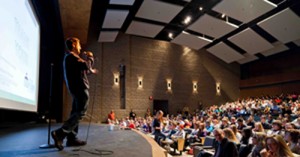ACE: Filling the Gap on Climate Science Education
Mario Molina
|May 11, 2012

In the coming weeks, the National Research Council will announce nationwide recommendations for science education standards. States are under no obligation to incorporate these standards into curricula. The standards are a milestone at a critical moment in science education nationwide. States can integrate some, all or none of these suggestions into their curricula. For those of us committed to empowering America’s youth with the most accurate and up-to-date scientific information, it is imperative the standards incorporate the scientific consensus on the evidence of climate change and its extraordinary risks to humanity.
We — those who work on the ground — must challenge ongoing attempts to institutionalize climate change denial. The Heartland Institute’s plan to weave denialism into American classrooms might be the most egregious example, but several states have passed or are considering laws that perpetuate myths that a bona fide climate change “debate” exists. Just this month Tennessee passed a law that protects the teaching of climate change denial.
Much like the industry-sponsored propaganda in the 1970’s surrounding tobacco’s connection to lung cancer, these tactics seek to systematically confuse and spread misinformation. These efforts undermine students’ mastery of critical scientific concepts. The notion of a debate despite scientific consensus (98% of scientists surveyed for 2010 National Research Council reports said that global warming exists and is caused by human activities) is not only inaccurate; the tactic seriously jeopardizes future generations’ ability to understand, manage and thrive amid 21st century challenges.
History shows us that there is no greater force for good than an educated, passionate group of young Americans. Time and time again, young people worked as the agents of change to push for progress and innovation — even when some of the country wasn’t ready for it. If today’s youth are going to once more lead the world in innovation, they will have to enter the workforce armed with knowledge and motivated by the urgency of energy independence. But that solid understanding has to start now and be reinforced from year to year —it’s up to those of us responsible
for their education to make sure they have the necessary tools to do so.
The Alliance for Climate Education (ACE) exists to explain the science behind climate change in a fun, interactive way. We outline the potential consequences, including damage to economic, social and environmental systems worldwide, but we emphasize realistic solutions. To date, more than 1.2 million high school students have seen our award-winning multimedia presentation, and tens of thousands have engaged in sustainability and energy savings projects in their schools and communities. Youth across the country are taking action and learning in the process, but their education will be undermined if teachers don’t accurately — and with the support of their supervisors and communities —convey the science behind existing climate change and the pathways to reducing its impact.
We often hear from teachers that accurate and, importantly, workable lesson plans on climate change aren’t available from their schools. ACE is working hard to fill that gap. Neither ACE nor individual teachers and administrators who understand the importance of climate change education can work in a vacuum, however. Success — a generation of young minds armed with the knowledge and will to tackle climate change solutions— requires collaboration across ideological, demographic and regional lines.
We can start by prioritizing climate change education in these new standards. We must then support the leaders within our administrations and in the legislation who insist state curricula incorporate consensus climate science. Last, we must prevent attempts to confuse our youth with inaccurate information. Whether generated by groups that are primarily funded by fossil fuel interests such as Heartland or others, the systematic support of denial undermines the education system beyond the science classroom. In our schools, quality science education, based on scientific consensus, must trump political agendas.
Join our Youth Action Network
More Blog Posts
Driving India towards self sufficiency and freedom from oil
India can shield itself from oil-price shocks and global pressure over Russian barrels by leaning harder into two strengths it …
Read More
Unnatural, Not Unprecedented
For two weeks, residents of Southern California endured a waking nightmare. Parents raced against time – hurrying down the driveway …
Read MoreCrafting a Vision for the Future: My Experience at LCOY USA 2024
Dry and sunny Tempe, Arizona where temperatures have been over 100 F for 113 consecutive days, delegates gathered to attend …
Read More